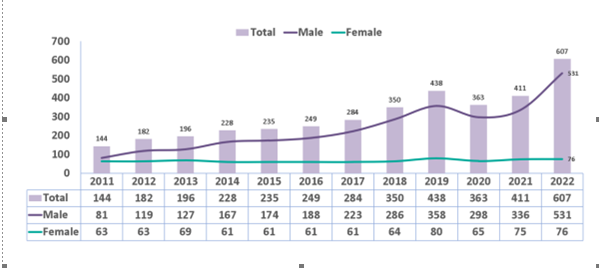The theme for World AIDS Day 2023 is ‘Fostering collaboration, empowering community leadership’.
Commemorating World AIDS Day provides an opportunity to accelerate national and international efforts against the spread of HIV infection, encourage actions and engagement by individuals, partners and the public and highlight the need for a stronger global, regional and national response.
HIV remains a major global public health issue, having claimed 40.4 [32.9–51.3] million lives so far. Globally, there were an estimated 39.0 [33.1–45.7] million people living with HIV (PLHIV) at the end of 2022.
In the South-East Asia Region (SEAR), at the end of 2021, an estimated 3.8 [3.3-4.4] million people were living with HIV which constitutes 10% of the global burden of HIV. In SEAR, epidemiological trends show that new infections declined by 42% from 190 000 in 2010 to 110 000 in 2021. Similarly, HIV-related deaths declined by 63% from 230 000 in 2010 to 86 000 in 2021. In the Region, the anti-retroviral treatment (ART) coverage has also tripled over the last decade.
Sri Lanka continues to maintain a low-level HIV epidemic. The term low-level epidemic is used for epidemics where HIV prevalence remains less than 1% in the general population and below 5% in any key populations such as female sex workers (FSW), men who have sex with men (MSM), or people who inject drugs (PWID). Currently, in Sri Lanka the estimated number of people living with HIV is 4 100 and AIDS-related cumulative deaths is less than 100. The HIV epidemic is currently concentrated among Key Population Groups with an overall positivity rate of 0.5%. The positivity rate among MSM is 1.3%, and among transgender (TG) women, it stands at 0.4%. The latest evidence shows that nearly 60% of new HIV infections in 2023 in Sri Lanka occur among MSM. The following graph shows the trends reported in HIV infections in Sri Lanka.

Figure 1: Trends of reported HIV infections by sex 2011-2022
In June 2022, the Seventy-Fifth World Health Assembly approved global health sector strategies (GHSSs) on HIV, viral hepatitis, and sexually transmitted infections for the period of 2022–2030 to guide the health sector in implementing strategically focused responses to achieve the goals of ending AIDS, viral hepatitis B and C and sexually transmitted infections by 2030. GHSSs aim to reduce HIV infections from 1.5 million in 2020 to 335 000 by 2030, and deaths from 680 000 in 2020 to under 240 000 in 2030.
The Integrated Regional Action Plan for viral hepatitis, HIV and sexually transmitted infections in South-East Asia, 2022-2026, provides an operational framework for the region aligned with the GHSSs, to implement key actions and combine shared and disease-specific approaches. The Regional Action Plan has five strategic directions which are oriented around service delivery, health systems, strategic information, community empowerment and innovations and provides overall guidance to countries to implement the strategies.
The National STD/AIDS Control Programme (NSACP) of the Ministry of Health is the government organization which coordinates the national response to HIV and sexually transmitted infections (STDs) in Sri Lanka. It works in collaboration with national and international stakeholders in controlling HIV in Sri Lanka mainly with Global Fund, UNAIDS and WHO. Sri Lanka aims by 2025 to achieve 95%-95%-95% targets for HIV diagnosis, treatment, and viral suppression as per targets set by UNAIDS (the Joint United Nations Programme on HIV/AIDS).
The NSACP has undertaken crucial decisions towards achieving national and international goals in relation to the prevention of STIs/HIV. The country has achieved the WHO certification for the Elimination of Mother to Child Transmission (EMTCT) of HIV and syphilis in 2019 and underwent successful revalidation in 2021. Sri Lanka is the fourth country in the region that achieved the validation certificate.
WHO continues to support Sri Lanka to implement its National HIV/STI Strategic Plan of Sri Lanka, 2023-2027. WHO assisted the Ministry of Health in HIV/STI-related policy decisions, updating of guidelines, data modeling and capacity building of staff on prevention, testing and treatment of HIV/STIs. During the economic crisis, WHO supported the MoH and procured HIV/Syphilis rapid antigen kits for a full cohort of pregnant women in order to maintain the elimination status of mother-to-child transmission of HIV and syphilis. During 2023, an annual meeting of Strategic and Technical Advisory Group on Viral Hepatitis, HIV and STIs (STAG-HHS) in South-East Asia Region and a joint consultation with National Programme Managers were held in Sri Lanka. This gave the opportunity to Sri Lanka to share its best practices with other Member States of South-East Asia region.
On 01 December, National STD/AIDS Control Programme will organize a public awareness campaign through the AIDS Day walk to foster collaboration. Public awareness will be also created through conducting a media conference, distributing leaflets and posters regarding HIV preventive activities, and organizing voluntary HIV testing services.
Henceforward, WHO Sri Lanka reiterates its commitment to support the Government to implement its national strategy for HIV/STIs and contribute to the acceleration of progress toward a world in which HIV/AIDS is no longer a public health threat.References:
- Annual Report-2021 National STD /AIDS Control Programme, Ministry of Health
- Are Key populations Really the Key to ending AIDS in Asia- putting Asia’s HIV response back on track -2018
- Integrated Regional Action Plan for viral Hepatitis, HIV and sexually transmitted infections in South-east Asia-2022-2026
- https://www.who.int/news-room/fact-sheets/detail/hiv-aids
- Sri Lanka College of sexual Health and HIV Medicine 2023
- Sri Lanka, AEM Projections 2023
